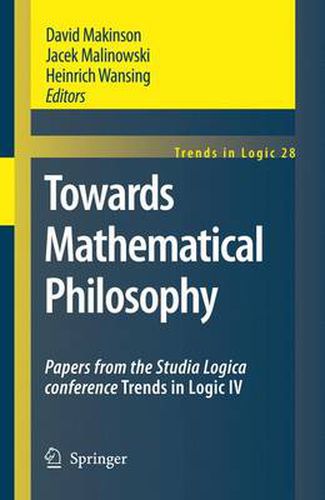Readings Newsletter
Become a Readings Member to make your shopping experience even easier.
Sign in or sign up for free!
You’re not far away from qualifying for FREE standard shipping within Australia
You’ve qualified for FREE standard shipping within Australia
The cart is loading…






This title is printed to order. This book may have been self-published. If so, we cannot guarantee the quality of the content. In the main most books will have gone through the editing process however some may not. We therefore suggest that you be aware of this before ordering this book. If in doubt check either the author or publisher’s details as we are unable to accept any returns unless they are faulty. Please contact us if you have any questions.
area and in applications to linguistics, formal epistemology, and the study of norms. The second contains papers on non-classical and many-valued logics, with an eye on applications in computer science and through it to engineering. The third concerns the logic of belief management,whichis likewise closely connected with recent work in computer science but also links directly with epistemology, the philosophy of science, the study of legal and other normative systems, and cognitive science. The grouping is of course rough, for there are contributions to the volume that lie astride a boundary; at least one of them is relevant, from a very abstract perspective, to all three areas. We say a few words about each of the individual chapters, to relate them to each other and the general outlook of the volume. Modal Logics The ?rst bundle of papers in this volume contains contribution to modal logic. Three of them examine general problems that arise for all kinds of modal logics. The ?rst paper is essentially semantical in its approach, the second proof-theoretic, the third semantical again: * Commutativity of quanti?ers in varying-domain Kripke models,by R. Goldblatt and I. Hodkinson, investigates the possibility of com- tation (i.e. reversing the order) for quanti?ers in ?rst-order modal logics interpreted over relational models with varying domains. The authors study a possible-worlds style structural model theory that does not v- idate commutation, but satis?es all the axioms originally presented by Kripke for his familiar semantics for ?rst-order modal logic.
$9.00 standard shipping within Australia
FREE standard shipping within Australia for orders over $100.00
Express & International shipping calculated at checkout
This title is printed to order. This book may have been self-published. If so, we cannot guarantee the quality of the content. In the main most books will have gone through the editing process however some may not. We therefore suggest that you be aware of this before ordering this book. If in doubt check either the author or publisher’s details as we are unable to accept any returns unless they are faulty. Please contact us if you have any questions.
area and in applications to linguistics, formal epistemology, and the study of norms. The second contains papers on non-classical and many-valued logics, with an eye on applications in computer science and through it to engineering. The third concerns the logic of belief management,whichis likewise closely connected with recent work in computer science but also links directly with epistemology, the philosophy of science, the study of legal and other normative systems, and cognitive science. The grouping is of course rough, for there are contributions to the volume that lie astride a boundary; at least one of them is relevant, from a very abstract perspective, to all three areas. We say a few words about each of the individual chapters, to relate them to each other and the general outlook of the volume. Modal Logics The ?rst bundle of papers in this volume contains contribution to modal logic. Three of them examine general problems that arise for all kinds of modal logics. The ?rst paper is essentially semantical in its approach, the second proof-theoretic, the third semantical again: * Commutativity of quanti?ers in varying-domain Kripke models,by R. Goldblatt and I. Hodkinson, investigates the possibility of com- tation (i.e. reversing the order) for quanti?ers in ?rst-order modal logics interpreted over relational models with varying domains. The authors study a possible-worlds style structural model theory that does not v- idate commutation, but satis?es all the axioms originally presented by Kripke for his familiar semantics for ?rst-order modal logic.